
Here we go: The next Read America Read Project is January 31st.
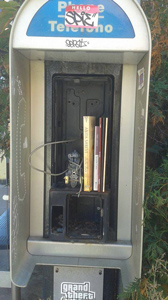
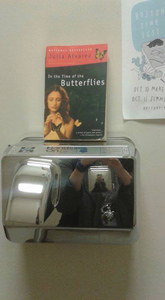
Leave a book for someone to take anywhere you want. This time, ask two people you know to do this also. This way the project
will grow each month. I would like a book marker to go in every book so people know where they are
coming from. Thank you for being a part of this project.
Lets make January 31st great! Send me photos too. I have a list of names of who
participated and as this grows, keep letting me know you are doing this. Thanks a zillion.
You all rock. Lets get America reading!!!!
e-mail: gloria@read-america-read.org
Thanks so much,
Gloria
|
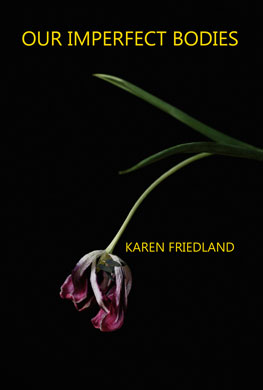
Once a nonprofit grant writer by trade, Karen had poems published
in the Lily Poetry Review, Nixes Mate Review, One Art,
and others. She was twice nominated for a Pushcart Prize. Her
previous books were Places That Are Gone (Nixes Mate Books)
and Tales from the Teacup Palace (Červená Barva Press). Karen
lived in the West Roxbury neighborhood of Boston with her
husband, two dogs and a cat. She was diagnosed with ovarian
cancer in November 2021, and died on April 14, 2024.
"I was diagnosed with ovarian cancer in November 2021, two
days before my 58th birthday. I recurred only a month or two
after 'frontline,' about a year later, rendering me incurable and
inoperable, and have been in continuous chemo treatment
ever since. Having terminal cancer has been a daily exercise in
searching for and finding meaning, beauty, kindness and even
hope amidst the brutality of a deadly diagnosis. Poetry helps
me reflect on, process and share this experience."
—Karen Friedland
"With grace and courage and style, Karen Friedland brings us along on her cancer journey; urging us to look at
the world as she does, through eyes that see the joyful sparkling of life in every gratitude-wrapped moment.
Whether she's walking her beloved dogs, or sitting in bed with pen and paper, she glories in being on this
side of the sod. Indeed, these poems about dying are really poems about living. I miss her, but I am happier
for having read them."
—Robin Stratton, author of Some Have Gone and Some Remain
"Some days, / the warmth- / every sensation- / is so beautiful . . . . I can hear Karen Friedland saying
these words. We're driving in my car on a hot July day. The sun is strong and the road glimmers. I can see her,
in my rearview mirror, as we chat about our cats and politics. As I read Karen's posthumous collection,
Our Imperfect Bodies, I think of the grace and honesty she displayed, allowing us all on her journey,
through her constellations of cancers. And though she rendered this to us in her poetry, she also
traveled on the knife-edge of hope and terror. Her poems are wild and kind and funny; all words I'd used
to describe this amazing poet. I don't want to get cocky / in my aliveness- she writes, and who can't
relate to this? I will miss Karen Friedland, and feel so honored to have called her my friend, for my
moments with her trapped in amber. I am grateful for Karen's poetry, for her words she left
behind, too. / Little brightly colored shards, / breadcrumbs.
We can follow her voice, with our imperfect bodies, we can hear her poetry."
—Jennifer Martelli, author of The Queen of Queens
Cover photo: "A Wilting Flower with a Black Background" by Ksenia Chernaya
$18.00 | ISBN: 978-1-950063-53-6 | 94 Pages
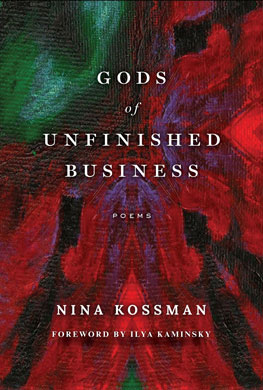
Nina Kossman's ten books include three volumes of poetry, two volumes of short prose in Russian and one in English,
an anthology she edited for Oxford University Press, two volumes of translations of Marina Tsvetaeva's poetry, and a
novel. Her English-language work has appeared in over ninety magazines and anthologies and has been translated into twelve
languages. Her plays have been produced in the US, the UK, and Australia. Her work in her native language, Russian,
was published in Russian-language literary magazines. She received grants from the Onassis Foundation, the Foundation
for Hellenic Culture, a NEA fellowship, and the UNESCO/PEN Short Story Award. She lives in New York where she edits
EastWest Literary Forum, a bilingual literary journal.
"When the mythological and personal meet, something transforms for this reader; perhaps that very
"semblance of meaning in a meaningless world" comes
to the surface. What is that meaning, you might ask. Perhaps it is awareness of how one isn't alone,
after all, and has never been alone on this planet,
despite what humanity’s so-called "progress" seems so intent to insist on."
—Ilya Kaminsky
$18.00 | ISBN: 978-1-950063-64-2 | 121 Pages
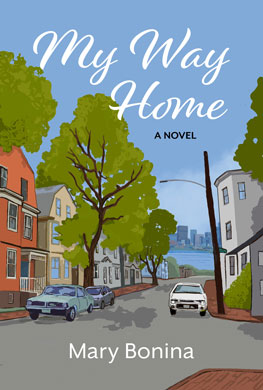
Mary Bonina is both poet and prose writer. My Way Home is her
debut novel. She is the author of My Father's Eyes: A Memoir, and
three published poetry collections: Living Proof, Clear Eye Tea, and
Lunch in Chinatown. Her poem "Drift," won the UrbanArts "Boston
Contemporary Authors" prize, and is engraved on a granite monolith,
a permanent public art installation in the City. She has been honored
as a fellow and awarded several residencies at the Virginia Center for
the Creative Arts, including at the VCCA retreat in Auvillar, France.
Her collaborative art experiments with composers, visual artists, and
sculptors, have expanded poetry's vocabulary and reach. A longtime
member of the Writers Room of Boston, where she served on the
Board of Directors for more than a decade, Bonina is a graduate of
the M.F.A. Program for Writers at Warren Wilson College.
"Mary Bonina's captivating debut deftly explores themes we all must wrestle with during our short stay on planet Earth.
How do we live meaningful lives while harboring dark secrets and gaping loss? What do we settle for when we cannot
get what we want? What does family really mean? Written with great wisdom and acuity, My Way Home is a beautiful novel,
full of truths about the human condition, the ways we delight and disappoint one another, the ways we save each other
with our generosity and love."
—Mary E. Mitchell, author of Starting Out Sideways and Love in Complete Sentences
"—A cautionary story all too relevant to a time when a woman's right to control her body is
somehow still—infuriatingly—unsettled."
—Gish Jen, author of Bad Bad Girl
"My Way Home is an often unsettling, always engaging novel full of honesty, heart, and grace. It is both
seductive and disturbing, and it will remind you of why you started reading stories in the first place—to be
carried away to a more vivid and compelling world."
—John Dufresne, author of My Darling Boy
"—A potent, provocative, and important novel."
—Anne Elezabeth Pluto, author of How Many Miles to Babylon?
"—Bonina’s novel is a haunting look at first love, teen pregnancy and the dangerous secrets about to erupt in a family. Magnificent."
—Caroline Leavitt, New York Times bestselling author of Days of Wonder and Pictures of You
"...My Way Home delves into a world of secrets, forgiveness, and 'a new idea of family.' Beautifully written...I loved it."
—Rosie Sultan, author of Helen Keller in Love and winner of the PEN Discovery Award
Cover Artist: Teresa Lagrange
$19.95 | ISBN: 978-1-950063-91-8 | 302 Pages
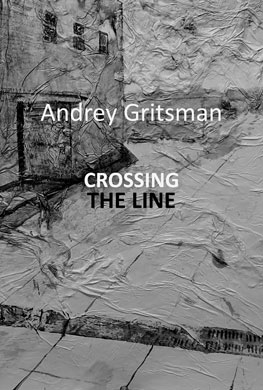
Andrey Gritsman, came to the US from Russia in 1981. He
is a physician, poet and essayist, writes in two languages. He
has been nominated for the Pushcart Prize several times and
shortlisted for PSA Poetry Prize. Poems, essays, and short stories
have appeared in many journals including New Orleans
Review, Notre Dame Review, and Denver Quarterly, anthologized
and translated into several European languages. He
authored fifteen books of poetry and prose in both languages.
He edits international poetry magazine Interpoezia
(www.interpoezia.org).
Previous collections from Červená Barva Press: Live Lanscape
and Family Chronicles.
www.andreygritsman.com
On CROSSING THE LINE
by Andrey Gritsman
"From a certain point onward there is no longer any turning back. That is the point that must be reached."
"A book should serve as the ax for the frozen sea within us."
These are quotes from Franz Kafka, who is the most important poet for the author of this book.
In this collection, the author tries to reach that point, to approach the line. Nobody knows where this point is and at what moment there is no turning back.
The collection mostly includes poems of the last ten years or so which, in metaphorical forms approach above mentioned point.
Some of the texts are prose poems that open new possibilities of language and metaphor.
"...poetics explores meanings and mysteries of human memory. But here, in Crossing the Line, I also get a
sense of clarity, as if one is writing about final things as if the perspective of a foreign language gives one
a distance that allows one to see things with precision that is almost eerie. Yes, there isn't just a welcome
strangeness here (as is often the case with writers who work in a foreign language), there is also a kind of
wisdom which comes from the experience of crossing that line..."
—Ilya Kaminsky
Cover design: Asya Dodina
The cover features the work by Asya Dodina and Slava Polishchuk
Exit XVIII from the Exits and Corners series.
$18.00 | ISBN: 978-1-950063-87-1 | 86 Pages
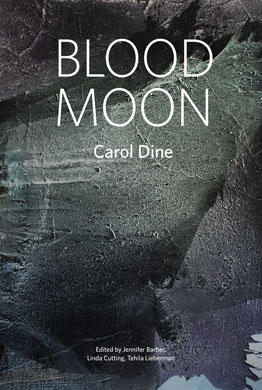
Carol Dine was a celebrated poet, essayist, and memoirist. Art
critic and author John Berger wrote of Dine's Van Gogh in Poems
(Bitter Oleander Press, 2009), "Her observation of [Van Gogh's]
drawings equals his observation of what he was drawing." Dine
read from the book at the Van Gogh Museum, Amsterdam, and
the Royal Academy of Arts, London. Her memoir, Places in the
Bone (Rutgers University Press, 2005), which combines prose
and poetry, deals with the redemptive power of art. Her poems
appeared in numerous literary magazines, including Aesthetica
Creative Arts Annual (U.K.), Bitter Oleander, Boulevard, Inkwell,
Lilith, and Salamander, as well as within the anthologies After
Shocks: Poetry of Recovery and Poems Against War: Bending Toward
Justice.
Dine received a grant from the Barbara Deming Memorial Fund
and the Sword of Hope from the American Cancer Society. She
lived in Brookline and she taught writing at Suffolk University
and the Massachusetts College of Art & Design.
In addition to Van Gogh in Poems and Places in the Bone, her
previous books include Naming the Sky, Trying to Understand the
Lunar Eclipse, and Orange Night.
Blood Moon explores twentieth and twenty-first century history through the stories of women who acted
heroically under the most extreme circumstances, at great personal danger, during wartime and times of
political oppression. It also focuses on the lives of women artists who documented the violence of their
times through their art. The author drew on many memoirs in the writing of this collection,
and the poems are both powerful and redemptive.
Dine's poems about women in extremis are pressed and compacted like diamonds. Her ability to empathize so completely
with brave women who suffered terribly, in wartime, from the never-ending human appetite for cruelty, moved me profoundly.
I have read Blood Moon over and over, and in my opinion, there is true greatness here. This volume of poetry surely
deserves a place in the canon.
—Michael Sandle, British sculptor and artist
Carol Dine's poetry has always engaged. Immersed in her subjects, committed to their individual lives as humans, her
language had to pursue, with deep compassion and trust, a full understanding of what it means to suffer and sometimes
not survive life's unexpected consequences. We can be thankful for the path she opened up for us and the work she
left behind so we, too, could observe the lives portrayed in Blood Moon.
—Paul B. Roth, Editor, The Bitter Oleander Press
Cover Image: SoHyun Bae, Jasper Lake: Wings, 2011, rice paper and pure
pigment on canvas, 200 x 150 cm
$18.00 | ISBN: 978-1-950063-96-3 | 82 Pages
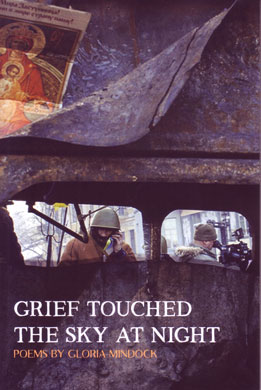
Gloria Mindock is editor of Červená Barva Press. She is an award-winning author of six poetry
collections and three chapbooks. Her
poems have been published and translated into eleven
languages. Her recent book, Ash, was translated into Serbian by Milutin Durickovic and published by Alma Press in
Belgrade in 2022. Ash,
published by Glass Lyre Press (2021), won the International Impact Award,
the NYC Big Book Award, the Firebird Speak Up Talk Radio
Award, The Pacific Book Award, the International Award - The
Princess, Noble Poetry Skills, Art Club of Ragkonik in Smederevo,
Serbia, a Distinguished Favorite for the Independent Book Award,
and a Bronze Medal from the North American Book Award.
Other awards include the Allen Ginsburg Award for Community
Service by the Newton Publishing Center, the Ibbetson Lifetime
Achievement Award, the 5th and 40th Moon Prize from Writing
in a Woman's Voice, numerous Pushcart nominations and three
citations for Červená Barva Press as an editor and community
service from the MA House of Representatives.
Gloria's work recently has appeared in Gargoyle, The James Dickey Review, 10 x 10, Ibbetson, Growth: Journal of Literature,
Culture, & Art (Macedonia), KGB Lit, and others. Gloria was the Poet Laureate in Somerville, MA in 2017 & 2018. For more
information about Gloria Mindock, visit her website at: www.gloriamindock.com
Gloria Mindock's book touches the very soul of Ukraine. The elevated stylistics and exceptional talent of the author reveal
in depth all possible dimensions of the inhuman Russian aggression. This poetic diamond is a generalized universal message to the
world, it is also the call of the Ukrainian heart, and it is a resistance against Putin's obscurantism. It is a powerful expansion
of the senses that, through the depth of feeling, shows us that even in the darkest hour the human spirit does not stop resisting,
rising, denying violence and carrying with it the eternal light of revelation and freedom. The author has achieved the perfect balance
between the senses, reality, experience and emotion, and has reached the first literary sublimation of its kind; it is a book-message,
unique in spirit, an artistic achievement woven of pain, hope, suffering, empathy and philanthropy. Gloria Mindock's genuine work is
the poetic witness on the war. It sings the song of Ukraine. It hurts. It soars. It peaks. It rises above. This is the artistic blast
that will defeat and outlive the apocalypse of Putin and his bloody regime. Grief Touched the Sky at Night is a book that will wait
for peace and victory and then be read and studied for a long time.
-Svet DiNahum, author of Escape from Crimea, Winner of Červená Barva Press Dissident Award, Honorable Member
of the Ukrainian National Writers' Association
These stark, candid, and radiant poems in Gloria Mindock's new collection give shape and space to voices lifted from the
clutter and clamor that is the matrix of war. The war is upon us now, but poets forever have sung such lamentations and haunted
us all too often throughout history. One thinks of Homer, Wilfred Owen, and Carolyn Forche. A fierce and generous tenderness and
enviable humanity ungirds these unflinching poems. Mindock's is the voice we need to hear at this very moment.
-Eric Pankey, author of Not Yet Transfigured
Gloria Mindock's poetry collection was written during the living experiences of the war, which unfortunately, continue. The
language of the poems is direct and full of metaphors, understandable, but concrete and abstract at the same time. Abstract to
the point that the words war, blood, killing, loss, Bucha, and Kyiv are now in a line synonymous with a huge tragedy,
"My body is naked// I did not remove my clothes. My dignity remains //while the dirt covers me //I love my country.
//I love my country. //I am Ukraine" In the poem Boots, as if the name is of a Ukrainian soldier or refugee, the poet
presents an opposing understanding to create the maximum effect of doom and helplessness. But at the same time an inner
resistance and stubbornness are presented in its last lines, bearing witness to resolve and hope. In Mindock's poems,
despite the depiction of a modern-day apocalypse, the understanding exists that "Everyone needs to be protected, // to be loved."
Clearly the role of poetry hasn't lost its significance.
-Vasyl Makhno, author of Paper Bridge, Translated by Olena Jennings; with an introduction by Ilya Kaminsky
Cover photo: Natalia Zhurminskaya
$16.00 | ISBN: 979-8-9885737-3-9 | 71 Pages
Ash by Gloria Mindock from Glass Lyre Press
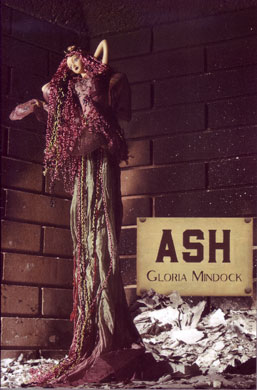

Gloria Mindock is the author of I Wish Francisco Franco Would Love Me (Nixes Mate Books), Whiteness of Bone
(Glass Lyre Press), La Portile Raiului (Ars Longa Press, Romania) translated into the Romanian by Flavia
Cosma, Nothing Divine Here, (U Šoku Štampa), and Blood Soaked Dresses (Ibbetson).
Widely published in the USA and abroad, her poetry has been translated and published into the Romanian,
Croatian, Serbian, Montenegrin, Spanish, Estonian, Albanian, bulgarian, Turkish, and French. Gloria has been published in
numerous literary journals including Gargoyle, Web Del Sol, spoKe, Constellations: A Journal of Poetry and Fiction,
Ibbetson, The Rye Whiskey Review, Muddy River Poetry Review, Unlikely Stories, Pratik: A Magazine of Contemporary
Writing and Nixes Mate Review and anthology. Gloria has been awarded the Ibbetson Street Press Lifetime
Achievement Award and was the recipient of the Allen Ginsberg Award for Community Service by the
Newton Writing and Publishing Center. She received the fifth and fortieth Moon Prize from Writing in a
Woman's Voice. Gloria was the Poet Laureate in Somerville, MA in 2017 & 2018.
In Gloria Mindock's powerful new book, the flames of love die out and the ashes linger until they dissolve into air.
The body is hostage, in charred relics of failed intimacies—The burnt-out ends of smoky days (T.S. Eliot).
There's beauty in the truth of Mindock's words and images: Things got smokier, battling the embers with//false waters.
And there's hope: Not everyone believes in destruction.// All the heart wants is to beat. Above all,
these poems radiate feeling, compassionately aware, attuned to a world of broken love that is burned beyond
recognition, the ashes drifting and settling: how much sorrow can this heart take?// There is never an answer.
Ash sears and sings.
—Dzvinia Orlowsky, author of Bad Harvest
In Ash, Gloria Mindock writes a gritty, beautifully haunting collection of poetry. Ash is what remains behind after
destruction, ruin, death, and burning. Similarly, the poems in this collection are what will remain. Fight the shadows
and wade through the darkness on a path paved by Mindock's vivid imagery, stark language, and dynamic voice, all of which,
make for a most memorable experience. Now more than ever, we need these poems. With the utmost economy of words, skillful
syntax, and emotional connections, each poem reverberates into the depths of your consciousness. Dark, intense, and wholly
unique, Ash, by Gloria Mindock is what you've been waiting for—a collection of poetry that consumes and smolders.
Are you ready?
—Renuka Raghavan, author of Out of the Blue and The Face I Desire
Gloria Mindock is a poet with singular vision: in Ash, a human heart is rolled out, then baked, then thrown to the birds;
broken crucifixes are shoved into junk drawers and gather dust; a spurned/murdered woman turns into a beautiful plant
that gives her ex-lover a rash. With mordant, Pinter-esque wit, Mindock explores just how far love, and even human
decency, can unravel—to the point of arson, to the point of war.
Ash begin with a series of poems about lethal house fires that may be literal or metaphorical ("my skin was burned by
your compulsion to be famous"), then expands to pinpoint the similar essence of human cruelty that enables soldiers to
kill. As the narrator of "Doomed by the Numbers" explains: "the fact is people will still go on brutally/killing each
other./Who will take my place and write about it?"
Ash concludes with an engaging, Rabelaisian roundelay of voices—mini-plays, summed up in just two stanzas, about
complicated relationships between two people.
Once again, with Ash, Mindock proves herself to be unafraid of the dark. She is truly a leading,
contemporary master of the edgy.
—Karen Friedland, author of Places That Are Gone and Tales from the Teacup Palace
Passionate and observant, Gloria Mindock is a tragic poet.
Her books are wounds revisited. She knows that nothing, never heals.
"With a rolling pin in my hand, I roll your heart out flat... stop it from beating.
The redness of blood turns to wax, sticky while wet." (Baked)
She senses the pain of the world in her being.
"The void looms deep, scorched like the desert blowing aimlessly." (Exit)
As her latest book Ash attests without doubt, Gloria is both a warrior and a martyr. Her words are
swords that slowly transform into tears.
Her anger at life's injustice is mighty, but mighty is her generosity and her openness towards repair, harmony and universal peace.
A must-read Ash conducts the reader through thorny labyrinths of pain and despair, allowing now and then a glimpse of ultimate
resolve and liberation in verses of a rare beauty:
"...but gravity is about to free me into space... People will look at me day and night and ask, "what is it?" There is no control
over what happens. The cathedral is high and my freckles fell on the floor as I left. Paleness now, that no one sees, but in
the universe, I will be a prism." (Gravity)
"...A hunger surrounds us, dust gathers, and is wiped off, space evading all this as songs of the wind come through the window
and we all hum." (Room)
—Flavia Cosma, author of In the Arms of the Father, Val-David, QC
$16.00 | ISBN: 978-1-941783-75-7 | 71 Pages
|
ABOUT THE PRESS
ČERVENÁ BARVA PRESS was founded in April of 2005.
The press solicits poetry, fiction, and plays from various writers
around the world, and holds open contests regularly for its chapbooks,
postcards, broadsides and full-length books.
I look for work that has a strong voice, is unique, and that takes risks with language.
Please see submission guidelines for current information.
I encourage queries from Central and Eastern Europe.

|

